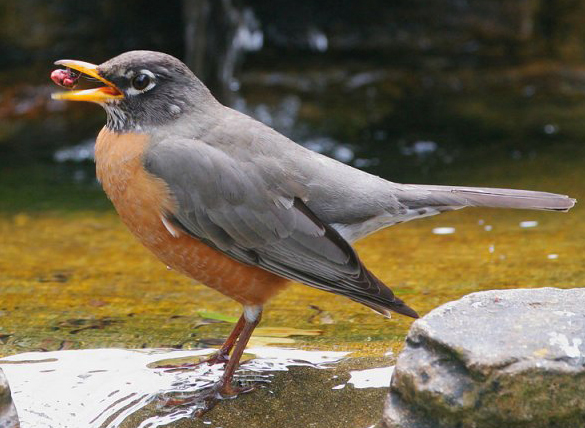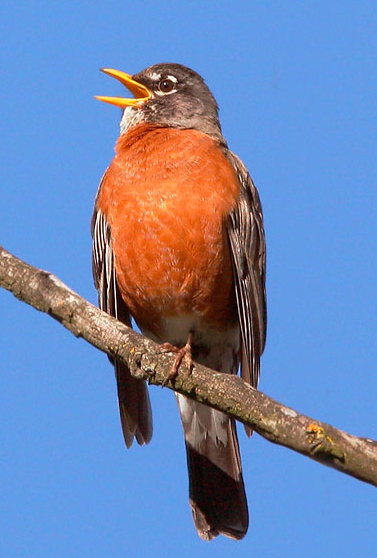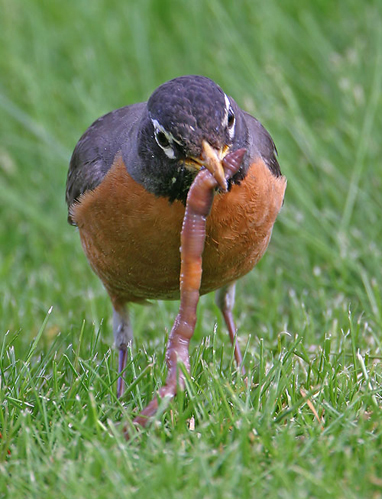BirdNote® The Early Bird
Air Date: Week of February 22, 2013

American Robin with insect (photo: Tom Grey
The proverb insists that the early bird gets the worm, but as Michael Stein explains in BirdNote®, feasting early might not be such a good deal.
Transcript
CURWOOD: Here at Living on Earth, we occasionally encounter evidence that a familiar proverb may, in fact, not be true. And in BirdNote® today, Michael Stein reveals one adage that seems to miss the mark.

American Robin singing (photo: Tom Grey)
[AMERICAN ROBIN SINGING]
STEIN: We’ve all heard about the “early bird” getting the “worm.” We know it as sound advice about initiative and timely action. And we can almost see that robin leaning back and tugging that recalcitrant worm out of the ground.
[COMICAL SOUND OF PULLING AND STRAINING WITH A “POP” AT THE END]
STEIN: Research shows, however, that birds dining early and heavily may lower their life expectancy. A study of three North American woodland bird species found that socially dominant birds stay lean during the day and then stoke up when it’s most important - later in the day, before a cold night. At night, birds avoid hypothermia by metabolizing fat. And by staying lean through most of the day, dominant birds are more agile in avoiding predators.

American Robin with worm (photo: Tom Munson)
Subordinate birds have to look for food whenever and wherever they can find it, and carry fat on their bodies to hedge against unpredictable rations. Dominant birds, which can push subordinates off food, can choose when they eat and so lessen their odds of being eaten themselves.
[AMERICAN ROBIN SONG]
Therefore, at least in the woodland bird’s world, the revised moral might read: “Get the worm late in the day - you’ll sleep better and live longer.”
[AMERICAN ROBIN SONG]
I’m Michael Stein.
[Written by Bob Sundstrom
Call of the American Robin provided by The Macaulay Library of Natural Sounds at the Cornell Lab of Ornithology, Ithaca, New York. Recorded by W.L. Hershberger
Producer: John Kessler
Executive Producer: Chris Peterson
Narrator: Michael Stein]
Links
Living on Earth wants to hear from you!
Living on Earth
62 Calef Highway, Suite 212
Lee, NH 03861
Telephone: 617-287-4121
E-mail: comments@loe.org
Newsletter [Click here]
Donate to Living on Earth!
Living on Earth is an independent media program and relies entirely on contributions from listeners and institutions supporting public service. Please donate now to preserve an independent environmental voice.
NewsletterLiving on Earth offers a weekly delivery of the show's rundown to your mailbox. Sign up for our newsletter today!
 Sailors For The Sea: Be the change you want to sea.
Sailors For The Sea: Be the change you want to sea.
 The Grantham Foundation for the Protection of the Environment: Committed to protecting and improving the health of the global environment.
The Grantham Foundation for the Protection of the Environment: Committed to protecting and improving the health of the global environment.
 Contribute to Living on Earth and receive, as our gift to you, an archival print of one of Mark Seth Lender's extraordinary wildlife photographs. Follow the link to see Mark's current collection of photographs.
Contribute to Living on Earth and receive, as our gift to you, an archival print of one of Mark Seth Lender's extraordinary wildlife photographs. Follow the link to see Mark's current collection of photographs.
 Buy a signed copy of Mark Seth Lender's book Smeagull the Seagull & support Living on Earth
Buy a signed copy of Mark Seth Lender's book Smeagull the Seagull & support Living on Earth

